|
|
"The Hanging":
Earth Condemned At COP-4Jiyoung Soh of the Korea Ecological Youth organization talks to Peter Doran about "Meltdown Countdown", a political theatre presentation at COP-4 to demonstrate against fossil fuel and nuclear-based energy sources. The group worked with Korea’s "legendary" environmental artist Choi Byoung Soo.
The street theatre presentation took the form of a pubic "hanging" in which a condemned Earth was suspended from a bridge by the fossil fuel and nuclear energy industries.
![]() Jioung Som, KEY, describes her organization and
the theater presentation
Jioung Som, KEY, describes her organization and
the theater presentation
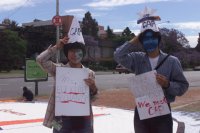 Mr. and Ms.
Flexible Mechanisms wear caps Mr. and Ms.
Flexible Mechanisms wear caps |
 The "hanging" and
destruction of the earth The "hanging" and
destruction of the earth |
 |
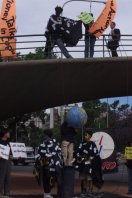 |
The Yaboti Biosphere Reserve in Argentina
The "Reserva de Biosfera Yaboti", with its 250.000 hectares, represents approximately 15 per cent of the native forest surface located in Argentina’s Province of Misiones. It is regarded as the country’s most important non-fragmented sector of native forests and enjoys a pivotal role as a green corridor that extends from the Park de Turbo in the east to the National Parks of Iguazú to the west.
Luis Alberto Rey, from the Ministry of Ecology in the Misiones province,
with Mario L Malajovic of the Reserva de Biosfera Yaboti translating, talks to the ENB
about an attempt to preserve the 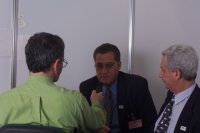 forests in his province by
introducing sustainable practices.
forests in his province by
introducing sustainable practices.
Luis Alberto Rey speaks with Peter Doran, via an interpreter
Latin American Parliamentarians Press Briefing
At this briefing, conclusions and recommendations from the Latin American Parliament's First Convention on Climate Change were reported. Their convention - held on 10-11 November in Buenos Aires - contained the following conclusions:
All countries should cooperate on mitigating the effects of climate change, in accordance with the principles of common but differentiated responsibilities.
The Kyoto Protocol was a major achievement, and the process of ratification should be concluded as soon as possible. Annex I countries need to meet the goals set out in the Protocol.
Developing countries should assume their own commitments towards stabilizing greenhouse gas emissions, while ensuring that such commitments don't hinder their right to develop.
Latin American representatives should participate in the establishment of national policies.
It also contained 10 recommendations:
Governments of the region should sign and ratify the Protocol.
Annex I parties need to start taking the lead without setting conditions that hinder the process.
COP4 participants need to implement the CDM expeditiously and in a way that is equitable to all regions and countries.
Other mechanisms should also be considered, including the transfer of technologies and resources to developing countries.
Developing countries should be given significant assistance in adapting to climate change mitigation policies.
Measures should encourage equitable development for all countries and not restrict international trade.
Latin American and Carribean representatives will work towards the creation of a national policy on climate change that will not be an obstacle to development.
Representatives will also help promote the necessary domestic legal reforms.
They will ensure that government actions are consistent with established national policy.
Finally, they will promote public participation in national policy development and implementation.
Dr. David Hallman, World Council of Churches on climate change
Dr. David Hallman, Programme Staff, Energy and Environment, The United Church of Canada, and Climate Change Programme Coordinator for the World Council of Churches,
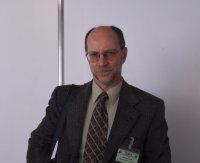 was one of the main speakers Sunday at
an ecumenical service in Buenos Aires to mark COP-4.
was one of the main speakers Sunday at
an ecumenical service in Buenos Aires to mark COP-4.
Right: Dr. David Hallman, World Council of Churches
Environmental Defense Fund (EDF, http://www.edf.org)
At a meeting organised by the Environmental Defense Fund, United States Senator Joe Lieberman (D, joe@edf.org) discussed a bill (S.2617) he has jointly introduced into Congress that seeks to provide credit for companies that take voluntary actions to reduce greenhouse gas emissions. Several multinational corporations- including BP, Shell, Intel and United Technologies- briefed the meeting on steps they have taken to reduce their emissions.
In this RealAudio interview, the EDF's Joseph Goffman discusses the meeting's aims and outcomes, as well as Senator Lieberman's bill.
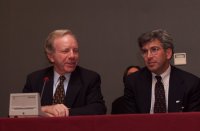 US Senator Joseph Lieberman,
Connecticut , and Fred Krup, Executive Director, Environmental Defense Fund (EDF) US Senator Joseph Lieberman,
Connecticut , and Fred Krup, Executive Director, Environmental Defense Fund (EDF) |
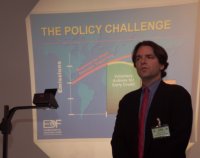 Joe Goffman, Senior Attorney,
EDF, addresses the policy challenge with respect to voluntary actions for early
credits Joe Goffman, Senior Attorney,
EDF, addresses the policy challenge with respect to voluntary actions for early
credits |
Employment and transition impacts of climate change
Workers will need to be won over to the climate change cause if the Protocol is to succeed, according to some of the panelists at this meeting.
The event was organised by:
- the International Confederation of Free Trade Unions (ICFTU)
- the Trade Union Advisory Committee to the OECD (TUAC)
- the European Trade Union Confederation (ETUC)
Chaired by Nicolas Tavidian (Global Legislators Organisation for Balanced Environment),
the event brought together 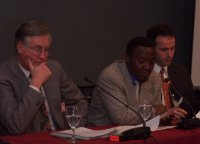 a variety of
interested groups, including unions, governments and business.
a variety of
interested groups, including unions, governments and business.
Left: Peter Mokaba, Deputy Minister, Environmental Affairs and Tourism, South Africa, discussing employment and transition impacts of climate change
In this RealAudio interview, the ICFTU's Lucien Royer (LRoyer@compuserve.com) discusses the meeting's aims and outcomes
Miscellaneous photos
 |
Yasutuka Fukuda from the Kiko Network, a Japanese Environmental NGO, spreads out hundreds of sea shells on which people have painted and decorated. The exhibition is called "Save the Seas" | 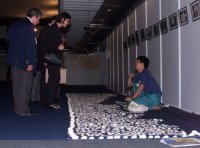 |
Return to ENB COP-4 home
© Earth Negotiations Bulletin, 1998. All rights reserved.

